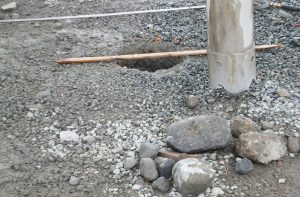Vacuum excavation is changing the way we approach civil engineering projects. With a focus on safety and precision, this method uses high-pressure air or water to break up soil, which is then removed by a powerful vacuum. This technique is far more controlled and less damaging to the environment compared to traditional digging methods. Because of its precision, vacuum excavation is ideal for working around underground utilities and complex infrastructures.
Understanding Vacuum Excavation in Civil Engineering
Vacuum Excavation in Civil Engineering is a modern and efficient way to dig, especially useful in civil engineering projects. This method uses high-pressure air or water to break up the soil and then removes it with a powerful vacuum. Unlike traditional digging, which relies on heavy machinery and manual labour, vacuum excavation is less invasive and much safer for underground utilities and structures.
Traditional digging methods can be risky. They often lead to damage to gas lines, water pipes, and electrical cables. This can cause significant delays and extra costs. Vacuum excavation, however, provides a safer alternative. It allows for precise digging without harming any existing infrastructure. This makes it ideal for projects that require caution and precision, such as laying new pipes or cables.
Moreover, vacuum excavation is more environmentally friendly. Traditional methods can cause significant soil disruption and erosion. In contrast, vacuum excavation targets specific areas, reducing the impact on the surrounding land. This approach helps maintain the natural state of the site and minimises waste. By using vacuum excavation in civil engineering, we can ensure projects are completed efficiently, safely, and sustainably.
Key Safety Practices for Vacuum Excavation
Safety is crucial in any civil engineering project, and vacuum excavation offers various safety benefits. However, following key safety practices is essential to maximise these benefits. First, it’s important to conduct a thorough site assessment before beginning any excavation work. This includes identifying the location of underground utilities and mapping out the excavation area accurately. Using advanced technology like ground-penetrating radar can assist in this process.
Wearing proper personal protective equipment (PPE) is another critical safety practice. Workers should wear helmets, gloves, safety glasses, and high-visibility vests to protect themselves from potential hazards. Ensuring that all workers are trained in vacuum excavation techniques is also essential. Proper training can prevent accidents and ensure the equipment is used correctly and safely.
Additionally, constant communication among team members is vital. Using hand signals or two-way radios can help coordinate the excavation process and alert workers to any issues that arise. Regular safety meetings can also keep everyone informed about the latest safety protocols and practices. Having an emergency plan in place is important for quick response in case of accidents or unexpected incidents.
By adhering to these safety practices, we can ensure that vacuum excavation projects are completed without any harm to workers or damage to existing infrastructure. This approach ensures that the benefits of vacuum excavation are fully realised, making it a reliable choice for civil engineering projects.
Steps to Ensure Precision and Efficiency
Ensuring precision and efficiency in vacuum excavation involves several key steps. First, thorough planning is crucial. Start by using detailed site maps and ground-penetrating radar to identify the exact locations of any underground utilities. By knowing where cables, pipes, and other utilities are located, we can minimise the risk of damaging them during excavation.
Next, adopting advanced technology enhances accuracy and speeds up the process. Using GPS-guided equipment can provide real-time data and help adjust the digging process as needed. This technology ensures that the excavation is targeted and precise, reducing the chances of errors.
Employing skilled operators is also vital. Experienced operators who understand the nuances of vacuum excavation can significantly improve the efficiency of the process. Proper training in the operation of vacuum excavation equipment ensures that the work is done correctly and safely.
Finally, it’s important to continuously monitor and adjust the excavation process. Regularly checking for any deviations from the plan and making necessary adjustments can help maintain precision. Keeping an eye on the excavation site allows us to address any issues immediately, ensuring the project stays on track and within budget.
By following these steps, we can achieve a high level of precision and efficiency in our vacuum excavation projects, making the most of this innovative technology while safeguarding existing infrastructure.
iVac WA’s Expertise in Supporting Civil Engineering Projects
At iVac WA, we understand the unique challenges faced by the civil construction industry. Our suite of services is designed to enhance safety, improve efficiency, and maintain environmental integrity in every project. We know that precision and caution are crucial to avoid damaging existing infrastructure, which is why our non-destructive digging (NDD) and hydro excavation services are ideal for these applications.
Our NDD and hydro excavation services allow for safe and precise excavation work around utilities and infrastructure. These methods reduce the risks associated with traditional excavation methods, providing a secure solution for your project. By using high-pressure water and powerful vacuums, we can excavate soil without disturbing or damaging existing underground utilities.
In addition to our excavation services, we offer spill response and clean-up solutions to ensure a safe and compliant site in case of any unexpected accidents. Our team is always ready to act promptly, minimising any environmental impact and ensuring that the site remains safe and functional. Furthermore, our liquid waste removal service helps manage waste effectively and in an environmentally friendly manner, ensuring compliance with all regulations.
Our industry-leading skills and equipment allow us to offer tailored solutions for all of Western Australia’s commercial and mining sectors. At iVac WA, we pride ourselves on providing reliable and professional services that keep your projects running smoothly and efficiently.
Conclusion
Vacuum excavation is a game-changer in civil engineering, providing a safer and more efficient way to dig around existing utilities. Through proper planning, advanced technology, skilled operators, and continuous monitoring, we can ensure that these projects are completed with the utmost precision and efficiency. Safety practices are also crucial, helping to protect both workers and infrastructure while maintaining a clean and compliant site.
At iVac WA, our commitment to supporting the civil engineering sector is evident in the wide range of services we offer. From non-destructive digging to liquid waste removal, our expertise and advanced equipment make us a reliable partner in your construction projects. Our focus on safety, efficiency, and environmental sustainability ensures that we can meet the unique challenges of each project.
If you want to integrate vacuum excavation into your next civil engineering project, trust iVac WA to provide the services and expertise you need. Contact us today to learn more about how we can help you achieve your project goals efficiently and responsibly.

